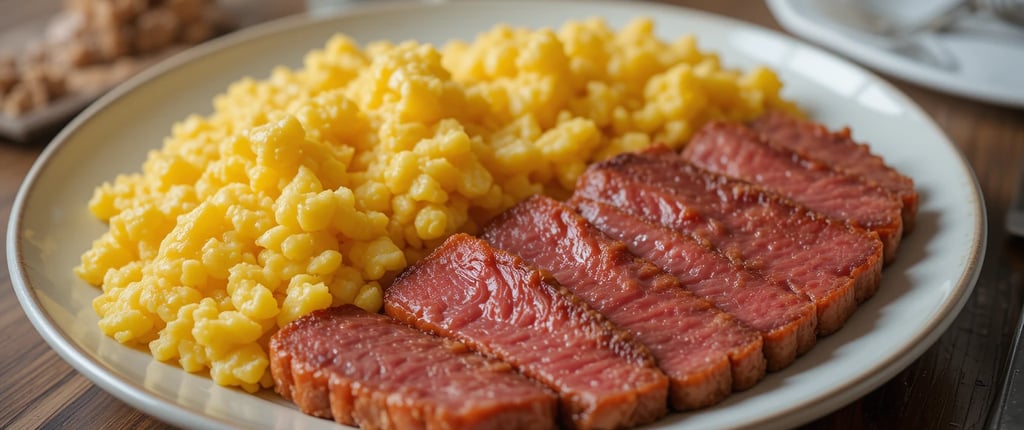"Uncover the truth behind the groundbreaking discovery of the causes of the world's biggest problems. 'The Root Causes' will change how you view the world!"
45 to 70 Years Female Who Had Early Puberty and Early Menarche Should Limit Their Egg and Red Meat Consumption to Reduce the Risk of Breast Cancer
Women aged 45 to 70 who experienced early puberty and early menarche face a higher lifetime exposure to estrogen, which can increase breast cancer risk. While eggs are rich in choline, consuming 3 to 5 eggs per day is not a direct cause of breast cancer; the risk is primarily linked to the liver enzyme FMO3 converting choline into carcinogenic TMAO. Red meat contributes similarly to TMAO production, making it important for high-risk women to moderate intake. Excessive use of vegetable oils rich in polyunsaturated fats further upregulates FMO3 activity, amplifying potential cancer risk. Maintaining hormone balance, focusing on healthy fats, and moderating choline-rich foods like eggs and red meat can help reduce the overall risk. Tags: #BreastCancer #EggsAndHealth #RedMeat #Choline #TMAO #FMO3 #Estrogen #VegetableOils #PolyunsaturatedFats #PremenopausalWomen #HormoneBalance #CancerPrevention
Glenn Rosaroso Vale, MT(AMT), MS(IT), MBA
9/22/20253 min read
Does Eating 3–5 Eggs Per Day Increase Breast Cancer?
Eggs are a beloved staple in diets worldwide. But in recent years, the question has emerged: does eating multiple eggs per day raise the risk of breast cancer? Some headlines claim that consuming 3–5 eggs daily is harmful, but the truth is more nuanced. The real story is not about the eggs themselves — but about how our bodies process them.
1. The Choline Connection
Eggs are one of the richest sources of choline, an essential nutrient for brain function, liver health, and cell membrane integrity. However, choline also follows a biochemical pathway that has been linked to cancer research:
Choline in eggs 🥚 is converted by gut bacteria into trimethylamine (TMA).
TMA is metabolized in the liver by an enzyme called Flavin-containing Monooxygenase 3 (FMO3) into trimethylamine N-oxide (TMAO).
TMAO has been implicated in both atherosclerosis and potentially in cancer risk.
At first glance, this suggests eggs — being high in choline — might directly contribute to breast cancer. But the picture is more complex.
2. Why Eggs Are Not the Real Culprit
The issue isn’t the eggs, but the upregulation of FMO3. Without high FMO3 activity, TMAO production is limited, and the connection between egg consumption and cancer risk is weak.
Two key drivers of FMO3 upregulation are:
Elevated estrogen levels 💃 – Women with early puberty and early menarche experience longer lifetime estrogen exposure. Higher estrogen levels naturally stimulate FMO3 activity.
Vegetable oils 🛢️ – Diets high in polyunsaturated fats (from soybean, corn, sunflower, canola oil, etc.) also increase FMO3 expression.
This combination creates the perfect storm: higher TMAO formation, more oxidative stress, and a greater cancer-promoting environment.
3. Why Age and Hormones Matter
Women between 45 and 70 who had early menarche face higher cumulative estrogen exposure across their lives. Research shows:
Premenopausal women aged 50–60 naturally have higher FMO3 activity compared to men or postmenopausal women.
After menopause, FMO3 activity decreases, but it can stay elevated in women on hormone replacement therapy.
This makes middle-aged and older women — especially those with early puberty history — more vulnerable to diet-driven TMAO effects.
4. The Role of Red Meat
Eggs aren’t the only source of choline and precursors of TMA. Red meat is also a major contributor to TMA and TMAO production. Combined with high estrogen states and vegetable oils, frequent red meat intake can further amplify the cancer-promoting environment.
This is why limiting both eggs (3–5 per day) and red meat may be a smart strategy for women at higher risk.
5. Practical Takeaways
Eggs are not the enemy. 1–3 eggs per day are generally safe in the context of a balanced diet.
Watch your oils. Excessive use of vegetable oils is a stronger promoter of FMO3 activity than eggs themselves.
Limit red meat. It contributes to the same TMA → TMAO pathway as eggs.
Focus on hormone balance. Women with early puberty, early menarche, or on hormone therapy should be more mindful of diet–enzyme–hormone interactions.
Lifestyle matters. Emphasize vegetables, healthy fats (olive oil, coconut oil), and fiber-rich foods to counteract TMAO buildup.
6. Conclusion
The belief that eating 3–5 eggs per day directly causes breast cancer is an oversimplification. The real driver is FMO3 enzyme activity, which is influenced by estrogen levels and vegetable oil consumption.
For women aged 45–70, especially those with early puberty and early menarche, limiting excessive eggs and red meat — while managing estrogen exposure and reducing polyunsaturated oils — is a more effective approach to lowering breast cancer risk.
Quick Summary
FactorRole in TMAO ProductionImpact on Breast Cancer RiskCholine in eggs 🥚Precursor to TMALow risk unless FMO3 is upregulatedFMO3 enzyme 🔥Converts TMA → carcinogenic TMAOHigh risk when overactiveEstrogen 💃Upregulates FMO3Increases TMAO formationVegetable oils 🛢️Upregulates FMO3Amplifies cancer riskRed meat 🍖Produces TMA like eggsAdds to TMAO burdenAge 50–60Peak premenopausal FMO3 activityHigher susceptibility
Bottom line: Eggs themselves are not a direct threat, but in women with early puberty, early menarche, and higher estrogen exposure, excessive eggs and red meat combined with vegetable oils can increase breast cancer risk through the FMO3–TMAO pathway.
Tags: #BreastCancer #EggsAndHealth #Choline #TMA #TMAO #FMO3 #LiverEnzymes #Estrogen #VegetableOils #PolyunsaturatedFats #PremenopausalWomen #CancerRisk
Health
Understanding illness to empower your well-being journey.
Wellness
Knowledge
info@rootcauseprevention.com
903-268-6664
© 2024. All rights reserved.
grfv@sbcgloal.net

